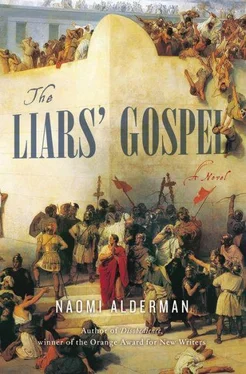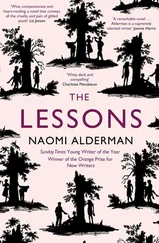Making himself examine it, he realizes she is dressed so modestly, it is impossible to fault her. A pair of loose white trousers, showing nothing of her legs. Apart from that slice of bare foot slipped into her leather shoes, visible when the trousers move just so. The brown, bare, warm skin. The tunic is loose also, seemly, white with a pale blue woven belt at the waist.
And yet when she stands, the daughter of Hodia, her black hair around her shoulders and her dark skin next to her white clothes, he can detect, somehow, the shape of her breasts under this modest garment. When she stretches her shoulders, pulling her arms back, he can see the nipples outlined for a moment against the fabric, as hard as dried beans and ringed by the raised zone of bumps he could read with his fingertips like words carved into stone.
And then he cannot help himself any longer. He pulls her towards him by her arm and she utters a little squeak but does not struggle, acquiesces softly and warmly, and he places his hand between her legs, cupping her where she is so hot, she is a furnace and he had forgotten what young girls are like, giving off so much heat.
She begins to move against his hand. This is overwhelming.
He pulls at her tunic, releasing a breast, and the excitement of feeling that warm softness and seeing the dark bruise-colored nipple makes him hold his breath before he descends on her with his mouth.
She is soft and she is warm and she is wet and she is hard. She smells of cloves and rain.
If he fucked her and did not marry her, she would be forbidden to any other priest of the Temple. This would be a terrible disgrace. She is the daughter of a wealthy man of the priestly class. She is expected to marry a priest. And he cannot marry her while he and his wife are yet married, for the Cohen Gadol, the High Priest above all, may truly have only one wife.
He stops short of entering her, and is astonished at himself, at his own maturity and composure, at the way that he almost, almost, straining towards her, almost does so but then remembers and pulls back. He finds that what he wanted after all was to consume that body, not to be consumed by it. That his desire had been to feel out every part of her, to see the gentle undulations of her soft belly and the way her breasts fall back when she lies down, and to hear her pant and cry out, and it would not have been right to go further, he knew that before he began. They may still have a wedding night. It is not entirely impossible.
He lies with her in the stillness of the hot afternoon on the floor of his chamber.
He says, “You were really never with any man before?”
She shakes her head gently, the sweat glistening on her cheek.
“Never a man,” she says.
Hmm, he thinks. Then: oh.
“Oh,” he says. It is the secret dream of the priests when they see the women’s enclosure and the curtained-off places where the women go. He allows this thought to grow in his mind, relishing the way it almost overwhelms his control. Almost, but not quite. If he wanted, if he were willing to relinquish certain other things, he could have this woman, she could be his wife. It is not impossible for a High Priest to divorce, just, in his case, unwise.
A thought occurs to him.
“Tell me,” he says, “I do not know your name.”
Her smile is mocking.
“You have never thought to ask one of your many servants and advisers?”
He shakes his head.
“What would you have called me on our wedding night? ‘Hodia’s daughter’?”
He reaches a hand to her soft breast again.
“Beloved,” he says, “I would have called you beloved, as in the Song of Solomon. And kissed you with kisses of the mouth, for you are sweeter than wine.”
She does not seem displeased by this, but there is a thinking mind behind those dark eyes.
“Did you ever love a woman without noticing whose daughter she was?”
He looks at her, while his hand kneads at her breast and the desire rises in him again, pleasingly.
“No,” he says. “Did you ever love a man without noticing his power?”
“Never a man,” she says. And try as he might, he never gets more of the story than that from her.
She leaves before it is time for the evening service. Though he is sad to see her put away her dark and comely body, he knows that it must be so.
At the door, she pauses and says, “Batsheni.”
He frowns.
“My name,” she says.
“Ah.” It is not a respectful name for a woman like this. “I think I would rather call you ‘beloved.’”
“Nonetheless,” she says, “Batsheni is my name. ‘Second daughter.’ In case my father ever forgot which order we came in, I suppose. The boys are called ‘God will make me strong,’ ‘God will enrich me,’ ‘God approves my right hand’ and so on.”
She closes the door softly as she leaves and the scent of her oils still hangs sweet in the room.
And that evening, when he visits the sanctuary, the chamber next to the Holy of Holies, for solitary prayer, he bends down and picks up a pinch of dust from the floor. He folds it into a scrap of linen and tucks it into his waistband. He keeps it safe.
Every morning and every evening, a yearling lamb makes sweet savors for the Lord — the perpetual daily sacrifice. And after that, between the many sacrifices brought by the people for sins and to make peace, to give thanks to the Lord for saving their life, in between all that at some point, every day, Caiaphas makes the offering on behalf of Rome. Every day, he sacrifices a pure white-fleeced lamb for the glory of the Emperor far beyond the Great Sea.
It is a compromise. For Rome has found it cannot operate in Judea in the same way that it franchises out its business to all its many other conquered states. There is an accepted routine which has worked well in these many other nations.
“Congratulations,” says Rome, after its armies have torn down the defending walls and set alight the pointed fences and killed the fathers and husbands and sons and brothers who had gone out that morning painted with war paint and screaming battle cries, “hearty congratulations to you, for you are now part of the Roman Empire. We will defend you against barbarians and bring you roads and aqueducts and various other civic amenities. In exchange you will give us tribute and we will take some of your people as slaves and exhibit your king and your precious objects in a triumph in Rome.”
“Yes,” say the conquered people, barely able to draw their eyes away from the smoldering heaps of men and animals and timber and stone, “that seems…yes.”
“Very good. And one other thing,” says Rome, “tell me, what is your local god here?”
“Why,” mumble the people, “we worship the Great Bull of the Mountain,” or it might be the Heron King, or Almighty Ba’al along with the Sea God Yam, or Mother Isis and her son, who dies and is born again each year.
“How charming,” says Rome, “we worship our current Emperor, Tiberius, and various members of his family, both those living and those forever alive, for they have conquered death. Here are their statues. Place them in your Temple and worship them as you do your Great Bull. That will be all.”
“Yes,” say the conquered people, as the stench of burning enters their nostrils and their eyes begin to water.
This approach, so helpful in tying conquered peoples into Rome in all other places, was surprisingly ineffective in Judea. It was because of the particular laws of the people: not to make an image of their one God, not to accept that His powers could be divided into separate entities, not to create any statue even of their most revered prophets or to allow any such emblem to be placed within their Temple. No man, say the Jews, can become a god and that is an end of it.
Читать дальше












